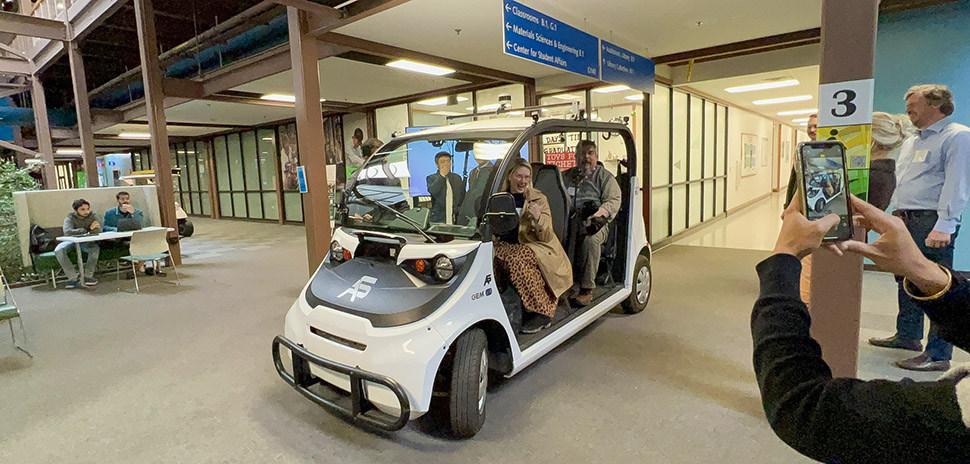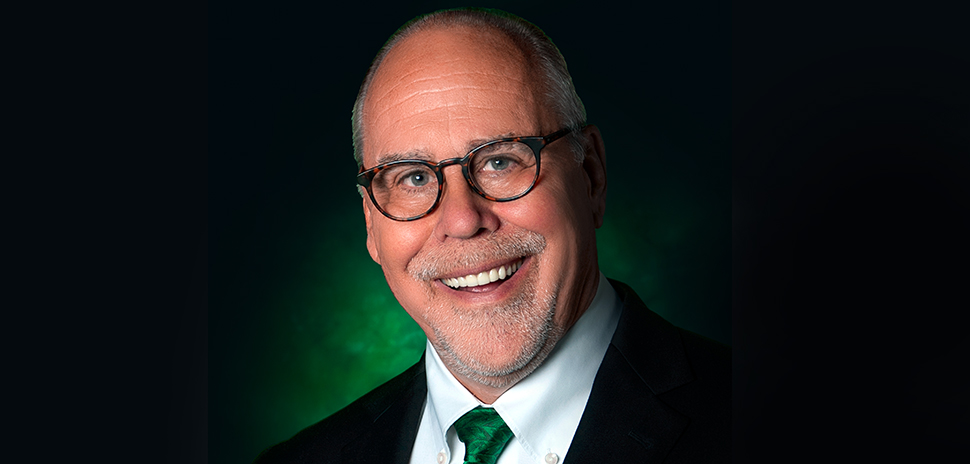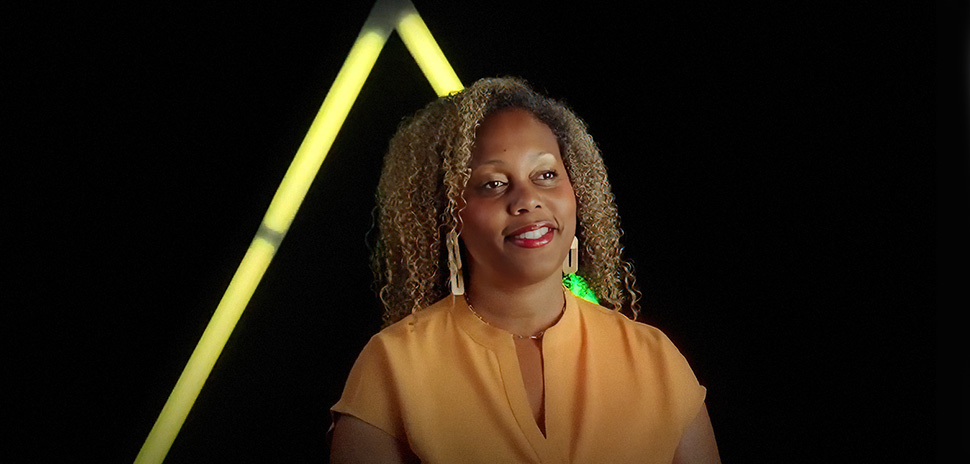As the great debate over remote vs. in-person work continues, neurodesigner Marissa Heyl is betting that the future of work isn’t just about where we do our jobs—it’s about how our workspaces can work for us.
The North Texas entrepreneur launched her company, Dallas-based Inclusive Wellness Design, in 2022. Since then, Heyl has been reengineering offices for the brain itself.
Forget foosball tables and fancy coffee machines. Think “Forest Bath” meditation rooms with preserved plants and nature sounds and “Desertscape” recharge rooms with customizable scents and healing vibrations.
“We’re designing for the DOSE neurotransmitter release,” Heyl explains, referring to dopamine, oxytocin, serotonin, and endorphins—the brain’s “happy chemicals.”

Tranquil innovation: IWD designed a wellness room for BioLabs’ Biotech Accelerator, offering a serene “Forest Bath” concept. [Image: Inclusive Wellness Design]
But Heyl’s designs aren’t just indulgences. They’re neuroscience-backed solutions to a corporate conundrum: In a world where work can happen anywhere, how do you make the office a destination?
Heyl wants to turn “You must come in” into “You won’t want to leave.”
“We need people to physically go into the office to build connections, to build trust,” Heyl says. “The kind of work that has to be done in terms of building trust, and collaboration, and teamwork, and culture of a company can really only be accomplished in person.”
Magnets, not mandates
Heyl’s approach to workplace design aims to create environments that attract.
“I’m trying to take the best of hospitality design, with resort design—even playground design—and kind of integrating that into a cohesive aesthetic that builds on the company culture,” Heyl said.
She sees real benefits for companies struggling with employee engagement or workers’ coffee badging to log their office hours. By creating spaces that employees actually want to be in, she says, companies can foster stronger team connections, boost morale, and drive productivity.

IWD’s Desertscape brain-reset room offers a life-sized Zen garden and sound healing, transforming stress into serenity. [Image: Inclusive Wellness Design]
The payoff goes beyond just having happier employees; it can be a significant draw for top talent, according to Heyl.
“What I really am passionate about doing is creating micro moments of well-being and mindfulness throughout the workday,” she says. These “micro-moments” appear in elements like sensory-rich hallways and nature-inspired sounds and textures, which help reduce stress and foster a calm environment.
For the neurodesigner, it’s about creating a workplace that’s more than just a location—it’s a community supporting mental and emotional well-being.
“We are stronger together,” Heyl said.
The science of space
Heyl’s blueprint for the office of the future includes three primary “flourishing zones”: Joy Lounges for connection, Innovation Hubs for collaboration and problem-solving, and Sanctuary Spaces for recharging.
These aren’t just fancy names for break rooms. Each space is designed based on principles of neuroscience and organizational psychology, according to Heyl.

Inclusive Wellness Design’s “Intercultural Joy Lounge” goes beyond typical break rooms
“Environment is the invisible hand that shapes human behavior,” she says, quoting James Clear, author of “Atomic Habits.”
Her designs incorporate elements that affect brain function positively. Innovation Hubs feature movement-oriented activities to spark new neural pathways. Intercultural joy lounges showcase artwork from underrepresented artists and decor from global artisans to foster belonging.
“We create inclusive spaces that build healthy habits, optimize potential, and celebrate diversity through sustainable, human-centered design,” Heyl explains.
The business case for ‘play’

IWD transforms traditional office space into Innovation Hubs to encourage movement, play, and hands-on activities. [Image: Inclusive Wellness Design]
“Play gives a competitive advantage,” Heyl says. She cites research showing that playful work environments can improve brain cognition, reduce stress, foster creativity, build resilience, and prevent burnout.
Rob Bliss, owner of The Meeting Place in Farmers Branch, has seen the impact firsthand. After Heyl unveiled her “Treehaus” concept—which Heyl describes as a “Meow Wolf-meets-Miraval experience”—in his networking hub, Bliss noted immediate interest.
“It brings a fresh approach to what a physical space can offer in terms of optimizing energy and connection,” Bliss said in a statement. “I [had] a few people sign up for membership even before its official debut.” (See “Treehaus” gallery below.)
Traditional finance sectors are embracing Heyl’s approach too.
At a Dallas-based investment firm, Heyl created a “Zen Lounge” sanctuary space. “We [did] a wellness room,” she says, demonstrating how her concepts can be integrated into different types of office environments even in traditional industries.

IWD’s “Zen Lounge” concept for a Dallas-based investment firm brings tranquility to the fast-paced world of finance.
Beyond the office
Heyl’s vision extends beyond corporate settings. She’s collaborating with BioLabs at Pegasus Park on a “Forest Bath” concept for its meditation room and working with a local university on an outdoor “mindful obstacle course.” She’s even developing plans for a “mindful amusement park and wellness retreat center” in Austin.
Well-connected in the business community, Heyl has shared her expertise at UT Dallas’ Center for Brain Health and recently co-hosted a design sprint for Conscious Capitalism with UNT professors. She also spoke at the Fierce Lab Women’s Empowerment Conference about joy and brain health earlier this month.

Marissa Heyl (right), a neurodesigner and founder of IWS, is collaborating on various projects with Gabby Everett, who heads up BioLabs Pegasus Park in Dallas. [Image: Inclusive Wellness Design]
The anthropologist’s touch
Heyl’s unique background sets her apart. With a degree in journalism and anthropology from the University of North Carolina and 15 years of experience working with artisan communities globally, she brings a distinct perspective to workplace design.
“My journey from anthropology to neuroscience wasn’t planned, but it was natural,” Heyl says. “I realized that creating effective workspaces requires understanding both human culture and brain function.”
After studying neuroscience and organizational psychology, Heyl merged her background in anthropology and social justice with her designs.
Her approach also extends to her supply chain. Inclusive Wellness Design collaborates with ethical suppliers and includes underrepresented global artisans and local BIPOC and LGBTQ+ artists in each custom space.

IWD’s “Intercultural Joy Lounge” bursts with vibrant hues and inspiring artwork. [Image: Inclusive Wellness Design]
Certifications meet sensory innovation
Heyl sees a new frontier in workplace wellness. IWD uses research such as Blue Zones, and standards like WELL v.2 from the International WELL Building Institute and FITWEL to create spaces that are scientifically sound and aesthetically pleasing.
“We’re not just making pretty spaces,” Heyl says. “We’re crafting environments that actively contribute to employee health and productivity.”
IWD’s work blends science and art. Its customizable scents, developed with Fort Worth-based Apothenne, evolve throughout the workday to combat burnout and reset the brain. Even the materials are chosen for their sensory impact, like a spalted maple veneer “tree” cured over two years.

Step into Canopy, IWD’s rainforest-themed sensory room, where nature meets neuroscience to boost employee well-being. [Image: Inclusive Wellness Design]
Transforming challenges into opportunities
While the industry is still adapting to neuroscience in design, Heyl aims to lead the way.
“Companies are clamoring for what we do,” Heyl says. “The challenge isn’t demand; it’s helping businesses understand this isn’t a luxury—it’s a necessity for the future of work.”
Undeterred by budget constraints in a relatively new field, Heyl has become a maestro of creative funding, exploring everything from grants to corporate sponsorships. She’s even eyeing partnerships with research institutions, positioning IWD at the forefront of workplace innovation.
Heyl’s team includes neuroscience advisors, DEI experts, neurodiversity consultants, and even a “human potentialist.” It’s more than an interior design firm; it’s a think tank for the future of work.
“We’re not just changing workplaces,” Heyl says. “We’re revolutionizing the very nature of work itself. Our goal? Spaces where people don’t just work, but truly flourish and find joy.”
GALLERY
‘Treehaus’: Where Nature Meets Neuroscience
Unveiled in June, IWD’s “Treehaus” project at networking hub The Meeting Place in Farmers Branch is a showcase of Inclusive Wellness Design’s innovative approach. The immersive environment features trees emerging from walls, “magic gratitude mushrooms,” a floating moon lamp, and Seuss-like fluffy plants. Each element is carefully chosen to stimulate the senses and promote well-being, creating space that’s both functional and fantastical.

[Image: Inclusive Wellness Design]

[Image: Inclusive Wellness Design]

[Image: Inclusive Wellness Design]

[Image: Inclusive Wellness Design]

[Image: Inclusive Wellness Design]
![]()
Get on the list.
Dallas Innovates, every day.
Sign up to keep your eye on what’s new and next in Dallas-Fort Worth, every day.



![Barbara Bush, co-founder and board chair of the nonprofit Global Health Corps, right, in conversation with Shena Ashley, vice president of Capital One community impact and investment and president at the Capital One Insight Center. [Photo: Capital One Reimagine Communities Summit 2024]](https://s24806.pcdn.co/wp-content/uploads/2024/06/CO.BarbaraBushPhoto3RCS.2024-crop.jpg)



























